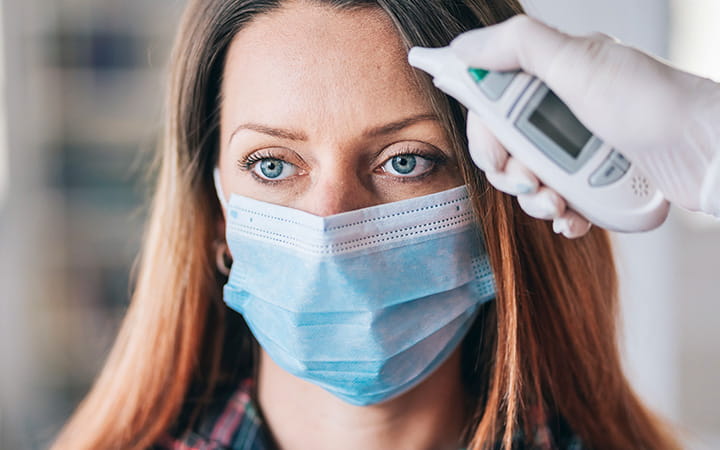5 Things You Should Know About Fever Clinics
August 02, 2020

Hospitals everywhere are treating patients with COVID-19 and related symptoms – in addition to treating COVID-19 patients who need care for other medical concerns.
If you have COVID-19 and need to seek medical care during the coronavirus pandemic, it’s important to know where to go for that care and that it’s perfectly safe to do so.
One practice that is contributing to keeping health care safe in many hospital systems is separating patients with COVID-19 or suspected COVID-19 from patients who do not.
During infectious disease outbreaks – such as the coronavirus pandemic – this separation is important, says the U.S. Centers for Disease Control (CDC). The CDC recommends separating patients with fever, respiratory or other COVID-19 symptoms so they are not waiting among other patients seeking care.
In response, many hospital systems – and University Hospitals is one of them – have created special clinics focused exclusively on diagnosing people with COVID-19 or treating people with symptoms of COVID-19 who also need medical care for minor illnesses or injury.
They go by different names, but these new “fever clinics” give patients with COVID-19 or COVID-19-like symptoms a convenient location where they can see a health care provider quickly.
The clinics separate people who may be contagious from other areas of hospitals and health centers, reducing potential spread of the virus. At the same time, these special clinics help ensure that only the sickest patients are taken care of in the emergency room.
Here are five things you should know about a fever clinic.
Who Should Go To a Fever Clinic?
Fever clinics are specifically geared toward treating people who have a fever, defined as a temperature of 100 degrees or higher, or other COVID-19 symptoms, such as extreme fatigue or severe cough. People with these symptoms also can get tested for COVID-19 if appropriate at a fever clinic.
Fever clinics also focus on treating adults and children who have COVID-19 and need care for non-life-threatening illnesses and minor injuries.
What Happens at a Fever Clinic?
Patients with COVID-19 or COVID-like symptoms are taken to a separate room for the safety of other patients and staff, where they can receive treatment for minor injuries or illness, such as:
- Respiratory illnesses, such as a sinus infection
- Sore or strep throat
- Back pain or strain
- Bladder and kidney infections, such as a urinary tract infection
- Earaches, such as an ear infection or swimmer’s ear
- Eye irritations and infection
- Gastrointestinal illness, such as a stomach ache, food poisoning, diarrhea or emesis
- Minor injuries and accidents
- Sprains, strains, bumps and bruises
- Cuts and lacerations
- Suspected fracture
- Skin and nail problems such as poison ivy or sunburn
If you’re seeking a COVID-19 test, a health care provider confirms your medical history, performs a physical exam if needed and obtains samples for lab tests, which may include a nasal swab to test for COVID-19. Patients also receive instructions about how to manage their symptoms, how to prevent the spread of their illness within their household and community, and when to seek additional treatment if their symptoms worsen or do not go away or lessen.
Why Go to a Fever Clinic?
Diagnosing and treating COVID-19 patients is the focus of fever clinics, so you will be seen by an experienced clinician quickly. Because the fever clinic staff focuses on one medical condition, they have developed a depth and breadth of expertise and experience in treating COVID-19.
By coming to a fever clinic for a COVID-19 test, you benefit from the full clinical expertise and support of the fever clinic’s medical providers, unlike purchasing a self-administered home test at a drugstore. In addition, most hospital-based fever clinics use their own labs for test analysis, so results are available more quickly than from the commercial labs used by drugstores.
Why Not Go To an ER?
If you have COVID-19 or develop symptoms of COVID-19, a fever clinic is the best place to go first, instead of the emergency room. You should only go to the ER if you have COVID-19 symptoms plus chest pain, severe shortness of breath or severe dehydration.
The emergency department prioritizes seeing the sickest patients first, so if you are only mildly symptomatic or have only a minor injury or illness, you will likely wait to be seen and could inadvertently expose others to the virus.
What Happens After the COVID-19 Test?
If your test results show you have COVID-19, it’s likely you can recover at home without the need for a doctor’s care or hospitalization. The fever clinic clinicians can provide support and advice on how to recover from the virus at home.
Related Links
University Hospitals is testing for COVID-19 in accordance with the Centers for Disease Control and Prevention (CDC) guidelines. If you suspect you have COVID-19 because of symptoms, University Hospitals offers safe, convenient locations across Northeast Ohio where you can get tested and treated. Learn more about how to obtain a COVID-19 test at UH.
Tags: Coronavirus


